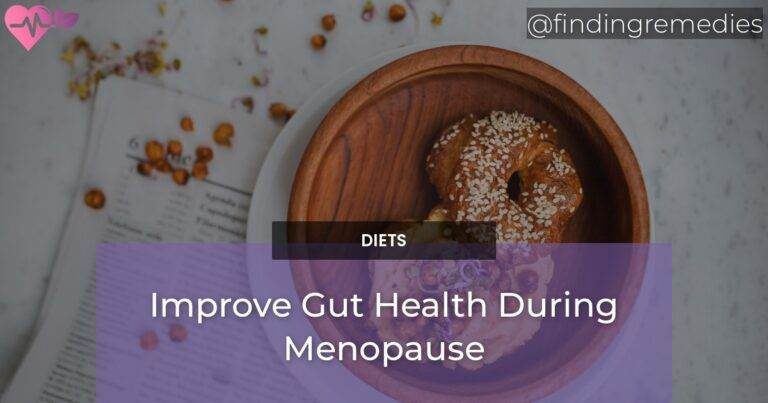Menopause is a natural phase in a woman’s life that brings about various changes in her body. Alongside the well-known hormonal shifts, menopause also affects gut health. The fluctuations in estrogen and progesterone levels during menopause can have a significant impact on the digestive system, leading to common digestive issues. However, there are ways to optimize gut health during this transitional period to alleviate symptoms and promote overall well-being.
Hormonal Changes and Gut Issues in Menopause
Estrogen and Progesterone Levels
During menopause, the ovaries produce less estrogen and progesterone, resulting in hormonal imbalances. These hormones play key roles in maintaining gut health by influencing digestion, gut motility, and the composition of gut bacteria.
Impact on Gut Health
The decline in estrogen levels can lead to changes in the gut microbiota, the collection of microorganisms residing in the digestive system. This alteration can adversely affect gut function and contribute to digestive issues.
ALSO READ
Common Digestive Issues During Menopause
Menopause can give rise to various digestive problems, including bloating, gas, indigestion, constipation, and diarrhea. These symptoms can be bothersome and affect the quality of life for many women.
Importance of Probiotic Foods
One effective way to improve gut health during menopause is by incorporating probiotic foods into the diet. Probiotics are beneficial bacteria that provide numerous health benefits, particularly for the digestive system.
Probiotic Foods to Relieve Symptoms
ALSO READ
What Are Probiotics?
Probiotics are live microorganisms that, when consumed in adequate amounts, confer health benefits to the host. They can be found in certain foods and supplements and are known to promote a healthy balance of gut bacteria.
Benefits of Probiotic Foods
Probiotic foods offer several benefits for gut health. They can help restore the balance of gut bacteria, improve digestion, enhance nutrient absorption, boost the immune system, and alleviate digestive symptoms.
Recommended Probiotic Foods for Menopause
When it comes to menopause and gut health, certain probiotic foods are particularly beneficial. These include yogurt, kefir, sauerkraut, kimchi, miso, and tempeh. These foods are rich in diverse strains of probiotics that can support gut health.
Incorporating Probiotics into Your Diet
Adding probiotic foods to your daily diet can be a simple and effective way to optimize gut health during menopause. Consider consuming yogurt with live cultures for breakfast, incorporating fermented foods into your meals, and exploring probiotic-rich recipes.
Managing Digestive Issues
Dietary Changes for Gut Health
Adopting a gut-friendly diet can significantly improve digestive issues during menopause. Focus on consuming fiber-rich foods, including fruits, vegetables, whole grains, and legumes, as they promote regular bowel movements and support gut health.
Fiber-Rich Foods
Fiber plays a crucial role in maintaining a healthy digestive system. It adds bulk to the stool, aids in bowel regularity, and acts as a prebiotic, promoting the growth of beneficial gut bacteria. Incorporate fiber-rich foods like flaxseeds, chia seeds, and oats into your diet.
Avoiding Trigger Foods
Identify and avoid foods that trigger digestive symptoms. Common culprits include spicy foods, fatty foods, caffeine, carbonated beverages, and artificial sweeteners. Pay attention to how your body reacts to specific foods and make necessary adjustments to your diet.
Importance of Hydration
Staying hydrated is essential for optimal digestion. Drink an adequate amount of water throughout the day to support bowel movements and prevent issues like constipation. Herbal teas, infused water, and consuming water-rich fruits can also contribute to hydration.
Stress Management and Gut Health
Stress can exacerbate digestive issues. Implementing stress management techniques such as deep breathing exercises, meditation, yoga, and engaging in hobbies can help reduce stress levels and promote a healthier gut.
Lifestyle Changes to Improve Gut Health
Regular Exercise
Engaging in regular physical activity can benefit both physical and mental health. Exercise helps stimulate bowel movements, reduce bloating, and relieve constipation. Aim for at least 30 minutes of moderate-intensity exercise most days of the week.
Adequate Sleep
Getting sufficient sleep is vital for overall well-being, including gut health. Lack of sleep can disrupt digestion and contribute to digestive issues. Establish a consistent sleep routine and create a sleep-friendly environment to improve the quality and duration of your sleep.
Mindful Eating
Practicing mindful eating involves paying attention to your body’s hunger and fullness cues, savoring each bite, and eating without distractions. This approach can enhance digestion, prevent overeating, and promote better absorption of nutrients.
Balancing Hormones through Lifestyle Choices
While menopause brings about hormonal changes, certain lifestyle choices can help balance hormone levels naturally. Eating a well-balanced diet, getting regular exercise, managing stress, and maintaining a healthy weight can contribute to hormonal balance and support gut health.
Seeking Professional Advice
Consulting a Healthcare Provider
If you experience severe or persistent digestive issues during menopause, it is advisable to consult a healthcare provider. They can evaluate your symptoms, provide personalized advice, and recommend appropriate interventions.
Evaluating the Need for Supplements
Supplements, such as probiotic supplements or digestive enzymes, may be considered if dietary changes alone do not alleviate digestive issues. Consult with your healthcare provider to determine if supplements are necessary and appropriate for your situation.
Considering Hormone Replacement Therapy (HRT)
In certain cases, hormone replacement therapy (HRT) may be recommended to manage menopausal symptoms. HRT can help relieve digestive issues that are directly related to hormonal changes. Discuss the potential benefits and risks of HRT with your healthcare provider.
Can Bone Broth Help with Gut Health During Menopause?
Bone broth is packed with nutrients and collagen that can help repair damaged gut lining. During menopause, gut health can be compromised, leading to digestive issues. Incorporating bone broth into your diet can aid in maintaining a healthy gut and alleviate discomfort commonly experienced during this stage.
Conclusion
Optimizing gut health during menopause is crucial for overall well-being. By understanding the impact of hormonal changes, incorporating probiotic foods, making dietary and lifestyle changes, and seeking professional advice when needed, women can effectively manage digestive issues and improve their quality of life during this transitional phase.

